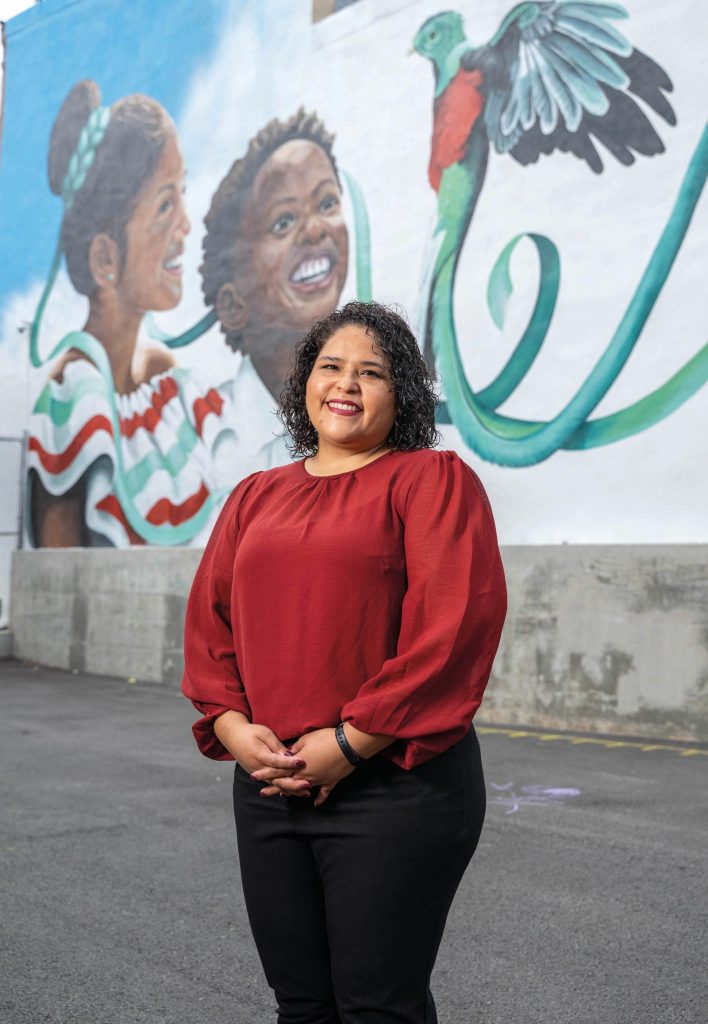BY CHRISTIANNA McCAUSLAND

BIO
College of Public Affairs
When the Francis Scott Key Bridge collapsed in March, Giuliana Valencia-Banks, B.A. ’21, M.P.A. ’23, knew without being told that it was immigrants who were working on the road that night. Her first concern was that there be interpreters onsite, something she was pleased to see the FBI handled well. Her next thought was to work with partners to ensure there were culturally competent, bilingual trauma counselors available for the affected families.
In an email statement reported in The Baltimore Sun at the time of the collapse, Governor Wes Moore stated, “This is an all-hands-ondeck moment for our state and we are thankful for leaders like Giuliana who are putting their passion and their skills to work on behalf of our fellow Marylanders.”
Despite the extraordinary circumstances, the work Valencia- Banks undertook for the families of the bridge collapse victims is part of her job description as the first-ever chief of Immigrant Affairs in Baltimore County. In the post, which she’s held for about a year, she oversees the county’s initiatives for economic development, community wellbeing and integration of immigrant communities. She’s not a service provider, but rather does strategic development and acts as an advisor to the county executive and other department colleagues on immigrant issues.
It’s a job description she knows well. She wrote it.
“I joined Baltimore County in 2021 as the first immigrant affairs outreach coordinator, and I realized quickly we didn’t need someone to represent the county executive at events or connect with community members,” she remembers. “What we needed was someone who could look at county government and how we could improve how we work with immigrants, how we could carve out a space where we could really think about new Americans and the challenges they face.”
As Baltimore County’s first ever Chief of Immigrant Affairs, Giuliana Valencia-Banks is giving a voice to those oft overlooked.
So, Valencia-Banks made the case to change her role. It was work she says she could not have done without her University of Baltimore education. “I give so much credit to The University of Baltimore because the education I received—the experienced professors I had, the opportunities I had to learn how to write a strategic plan, a budget, how to do data analysis—allowed me to apply what I learned there in real life.”
Valencia-Banks explains that her role at the county has been a longtime coming. Although 11 percent of its population are new Americans, it wasn’t until the pandemic that officials realized they were behind in their ability to disseminate information to this populace. The biggest issue Valencia-Banks tackles is language access, but she’s also working with county departments to understand the unique challenges of different immigration experiences, whether it is someone here as a refugee or asylum seeker, or families living as mixed households where some, but not all members, may be lawful residents or U.S. citizens.
The immigration system is extremely complex (Valencia-Banks likens it to a rotary phone in a smart phone world). Her goal is to help new Americans get access to programs they are entitled to and to feel safe engaging with county agencies—calling the police, for example. In a moment in time when immigration gets vilified, she also wants to change the narrative around these new neighbors.
It’s work she takes personally. As a child, Valencia-Banks emigrated with her family from Peru to the United States. She grew up in Florida. Although she became a naturalized citizen before she turned 16, she knows what it’s like to be the interpreter and translator in a family of non-English speakers or to manage without social capital and connections. It was here in Baltimore, where she moved to be with her husband, that she found her passion for this work.
“I started working at Cristo Rey [Jesuit High School] and fell in love with the kids and the families,” she says of the school where roughly a quarter of students are Hispanic. “Since I was bilingual, I helped families not just with school but with calls to their mortgage companies or to BGE. It reminded me what immigrants go through trying to find that one person who can help them.”
Although she knew human services was her calling, her education background didn’t match up. She went to UBalt first to get a bachelor’s degree in human services administration before immediately returning to pursue the Master in Public Administration program. “I have a lot of gratitude for my professors and for how affordable and workable UBalt is,” she says. “The education I’ve received has empowered me to advocate for why local jurisdictions must increase their capacity to provide services to immigrants.”
